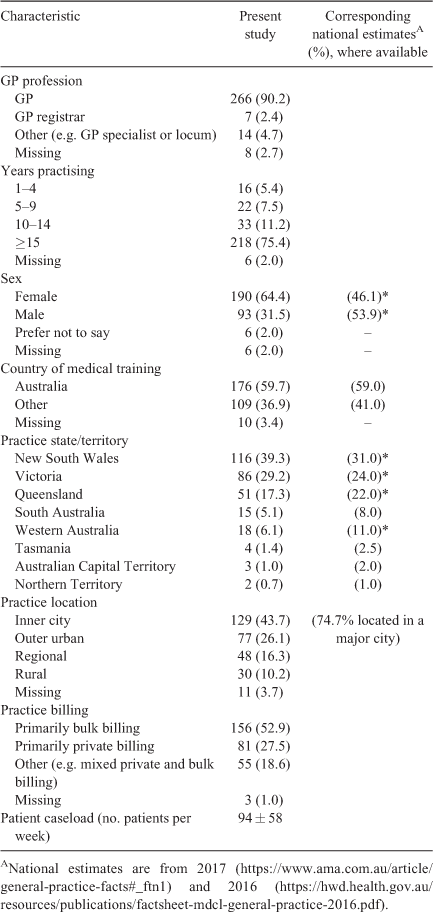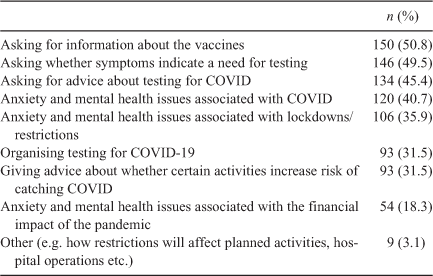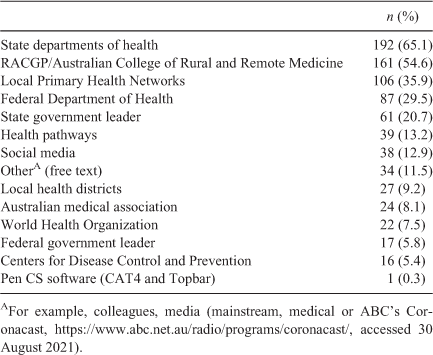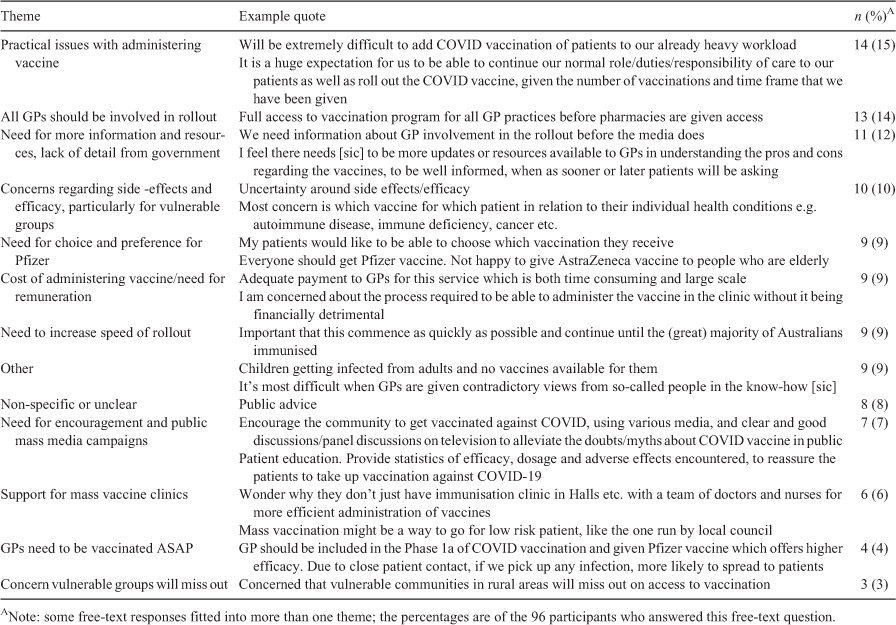COVID-19 challenges faced by general practitioners in Australia: a survey study conducted in March 2021
Tessa Copp A D , Jennifer M. J. Isautier A , Brooke Nickel A , Kristen Pickles A , Marguerite Tracy A , Jenny Doust B , Carissa Bonner A , Rachael H. Dodd A , Julie Ayre
A D , Jennifer M. J. Isautier A , Brooke Nickel A , Kristen Pickles A , Marguerite Tracy A , Jenny Doust B , Carissa Bonner A , Rachael H. Dodd A , Julie Ayre  A , Erin Cvejic A , Lyndal Trevena A , Ramesh Manocha C and Kirsten J. McCaffery A
A , Erin Cvejic A , Lyndal Trevena A , Ramesh Manocha C and Kirsten J. McCaffery A
A Faculty of Medicine and Health, Sydney Health Literacy Lab, School of Public Health, The University of Sydney, Sydney, NSW 2006, Australia.
B Centre for Longitudinal and Life Course Research, School of Public Health, The University of Queensland, Brisbane, Qld 4006, Australia.
C HealthEd Pty Ltd, Sydney, NSW 1805, Australia.
D Corresponding author. Email: Tessa.copp@sydney.edu.au
Australian Journal of Primary Health 27(5) 357-363 https://doi.org/10.1071/PY21165
Submitted: 14 July 2021 Accepted: 26 August 2021 Published: 30 September 2021
Journal Compilation © CSIRO 2021 Open Access CC BY
Abstract
Limited studies at the beginning of the COVID-19 pandemic found GPs have been negatively affected by increased workload, reduced income and major concerns about staff and patient safety. This study aimed to investigate the challenges of COVID-19 in general practice 1 year since it was declared a pandemic. A national cross-sectional online survey was conducted in March 2021 of a convenience sample of 295 Australian GPs attending an online educational webcast. Twenty-five multipart and free-text questions collected information regarding GPs’ main COVID-19-related issues and concerns, including COVID-19 vaccines, useful sources of information, information needs and their perceived role as GPs in COVID-19 management. Descriptive statistics were calculated for all quantitative variables. Content analysis was used to analyse text data from open-ended questions. Of the 596 eligible attendees of the online educational webcast, 295 completed the survey (49.5% response rate). One year since COVID-19 was declared a pandemic, GPs still have concerns regarding patients ignoring prescreening and presenting with flu-like symptoms, the safety of their colleagues and family and catching COVID-19 themselves, as well as concerns about the effect of the pandemic on their patients and patients delaying essential care for non-COVID-19 conditions. More education and resources about vaccines was identified as the top information need, which will assist with what GPs’ perceived to be their key roles in managing the COVID-19 pandemic, namely educating the public, correcting misunderstandings and providing the COVID-19 vaccine. These findings highlight gaps in communication and information, particularly regarding COVID-19 vaccines. GPs need high-quality information and resources to support them in undertaking complex risk communication with their patients.
Keywords: coronavirus, general practice, public health, vaccine hesitancy, vaccines.
Introduction
GPs are the gatekeepers to health care and are on the front line during the COVID-19 pandemic, helping people when they are unwell and providing information about virus spread, testing and vaccination (Huston et al. 2020). However, media coverage throughout 2020 has suggested that GPs have been dissatisfied with communication from the federal government and feel they have been poorly utilised in the response to COVID-19, despite being ideally placed to help their communities contain local outbreaks (Crimmins 2020; Le Grand 2020). A non-peer-reviewed survey of 104 Australian GPs in March 2020 by Medical Republic, an online and print newspaper for GPs and other medical professionals in Australia with an online daily reach of approximately 24 000, the majority of whom are GPs, found that 72% were unsatisfied with the federal government’s response to the crisis in primary care (Crimmins 2020); however, peer-reviewed published studies are lacking.
Changes to GPs’ practice and workload have also been substantial (Thornton 2020). Although telehealth increased during the pandemic (from 0% to 34% of all consultations; Snoswell et al. 2020), a nationally representative survey of the Australian public found one in six people had cancelled or postponed a doctor’s appointment because of the COVID-19 pandemic (Australian Bureau of Statistics 2021). This is concerning because reduced health care utilisation during pandemics has been associated with poorer health outcomes and increased mortality (Griffin 2020). Concerns about doctors’ mental health and stress levels have also been documented at the start of the pandemic, arising from the significant changes in practice, increased risk to their own health and high levels of uncertainty about revenue flows. A national report (not peer reviewed) of 2235 Australian GPs and non-GP specialists in May 2020 found that 65% of participants reported a fall in monthly income, with 31% feeling moderately or very financially stressed about their private practice (Scott 2020). In addition, almost 50% of GPs were moderately or very dissatisfied with the ability to access personal protective equipment (PPE), which was associated with increased stress (Scott 2020). The only peer-reviewed survey conducted in the early stages of the pandemic in Australia similarly found GP practices had been negatively affected by increased administration and workload, reduced billable time and major concerns about staff and patient safety (Kippen et al. 2020).
Understanding the challenges faced in their clinical practice as the pandemic continues is important to help support GPs and optimise Australia’s evolving COVID-19 response. The aims of this study were to identify: (1) the challenges GPs are facing in their practice 1 year since the World Health Organization declared the coronavirus outbreak a pandemic; and (2) how to better support GPs and their role in supporting the community as the pandemic evolves.
Methods
Study design
A cross-sectional online survey was administered using the online survey software SurveyMonkey. The study was approved by The University of Sydney Human Research Ethics Committee (2020/771).
Participants and setting
Participants were GPs attending a multitopic online educational webcast organised by HealthEd, a private medical education company that organises seminars and learning resources for GPs on various health topics.
The webcast was held on 17 March 2021 and comprised medical topics unrelated to the pandemic (the 2021 influenza vaccine, Australia’s national cervical screening program, bariatric surgery and functional gut disease in infants). This period was when COVID-19 vaccines were just about to be rolled out by hospitals for those eligible under Phase 1a in Australia. The online survey was distributed to attendees immediately after the webcast. All GPs and GP registrars attending the educational webcast and currently practicing in Australia were eligible and invited to participate.
Measures
The survey consisted of 25 questions devised specifically for this study, including multipart and free-text responses (see Supplementary Appendix S1), with all questions piloted and reviewed by an advisory group of GPs (JD, MT, LT, RM) to ensure relevance. Demographic variables included years practicing as a GP, sex, country of medical training, state and location of professional practice, type of billing and patient caseload. In addition to demographics, participants indicated the main COVID-19-related issues their patients presented with and their level of concern with several issues. Participants also indicated how serious they considered COVID-19 to be a public health threat in Australia, their encounters with patients who under- or overestimate the risks of COVID-19, useful sources of information about COVID-19, current information needs and what they perceived the role of GPs should be in COVID-19 management. Two open-ended questions asked about additional challenges or concerns regarding practicing during the pandemic, including the COVID-19 vaccination rollout.
Data analyses
Analyses were conducted using IBM SPSS v26. Descriptive statistics (mean ± s.d. for continuous variables, frequencies and percentages for categorical variables) were calculated for all participant characteristics and survey responses. Missing data were retained to provide a complete report of the data.
Content analysis, a widely used analysis method that combines qualitative and quantitative methods to analyse text data (Weber 1990), was used for the two open-ended questions. Two authors (TC, JI) reviewed the free-text responses and developed a list of initial themes independently for both open-ended questions. One author (TC) then reviewed both lists and created a coding framework. Both authors (TC, JI) double-coded all free-text responses into the framework, with iterations to the framework as required. Cohen’s κ indicated substantial agreement (0.744). Any discrepancies in coding were discussed and resolved, and the frequency of each theme was calculated.
Results
Of the 596 eligible attendees of the HealthEd webcast, 295 completed the survey (49.5% response rate).
Demographic and practice characteristics
Most participants were female (64%), had undertaken their medical training in Australia (60%) and had more than 15 years practice experience (75%). Most worked at an inner city (44%) or outer urban (26%) practice, and were primarily bulk-billing practices (53%). Demographic and practice characteristics are presented in Table 1.

|
Attitudes, concerns and experience practicing during the COVID-19 pandemic
Main issues for patients
The main COVID-19-related issues and requests GPs reported their patients presenting with are listed in Table 2. The most commonly selected issue was patients asking for more information about the COVID-19 vaccines (51%), followed by patients asking whether symptoms indicate a need for COVID-19 testing (50%) or asking for advice about testing (45%).

|
Concerns about practice issues related to COVID-19
Over one-third of participants reported being very or extremely concerned about the effect of the pandemic on patients (40%), patients presenting with flu-like symptoms and ignoring COVID-19 prescreening (39%), safety issues for colleagues/family (e.g. spreading the virus; 36%) and patients cancelling or delaying appointments for essential care (34%). Other common concerns included inadequate assessment via telehealth (31%), personal exposure to COVID-19 (25%) and patient willingness to accept COVID-19 vaccines (21%; Table 3).

|
GPs’ and their patients’ perceived threat of COVID-19
Respondents were asked to rate how serious a public health threat COVID-19 was currently in Australia on a 10-point scale (1 = no threat; 10 = very serious). The mean rating was 6.55 ± 2.54, indicating that respondents believed COVID-19 to be a serious public health threat in Australia.
Just over one-third (37%) of respondents indicated that it was somewhat common (once a day) to very common (many times a day) to encounter patients who severely underestimated the risks of COVID-19 (e.g. think it is all a hoax). Similarly, 39% indicated that it was somewhat or very common to encounter patients who severely overestimated the risks of COVID-19 (e.g. are afraid to leave the house).
Sources of information regarding COVID-19
The three most commonly selected useful sources for COVID-19 information for GPs were the state department of health (65%), the Royal Australian College of General Practitioners (RACGP)/Australian College of Rural and Remote Medicine (55%) and local primary health networks (36%; Table 4).

|
Top 3 education needs of GPs
Two-thirds (67%) of GPs wanted more education and resources about COVID-19 vaccinations, 28% wanted more information about treatment for COVID-19 and 25% wanted more information about viral transmission and spread.
GPs’ role in COVID-19 management
Most respondents perceived their role during the pandemic to be supporting the uptake of COVID-19 vaccines (77%), providing patients with reliable sources of information (71%) and correcting misunderstandings (71%). In contrast, only 25% indicated they should have a role in conducting COVID-19 tests (Table S1).
In terms of whether the needs of GPs were being considered in response to COVID-19 by state and federal governments, 13% indicated ‘not at all’, 37% indicated ‘a little’, 31% indicated ‘somewhat’ and 15% indicated ‘a lot’.
Content analysis of free-text responses
Of the 78 participants who responded to the free-text question, ‘Are there any other important points, challenges or issues you would like to raise in relation to practising during the pandemic?’, the most common themes were about dissatisfaction with the government response (e.g. inconsistent and changing rules; n = 12), the benefits of telehealth (e.g. calls to keep telehealth Medicare Benefit Schedule (MBS) items; n = 9), changes to and impact on practice (n = 9) and that better communication and support from the government was needed (n = 8; for themes and corresponding example quotes, see Table S2).
Regarding the free-text question about the COVID-19 vaccination rollout (‘Are there any other important points, challenges or concerns you would like to raise in relation to the COVID-19 vaccination roll-out in Australia?’), the most common themes (out of 96 responses) were practical issues with administering the vaccine (n = 14), desire for greater involvement of GPs in the vaccine rollout (n = 13) and the need for more information and resources for communicating about the vaccine with patients (n = 11; for all vaccine themes and corresponding quotes, see Table 5).
Discussion
The findings of the present study illustrate that, 1 year since the COVID-19 outbreak was declared a pandemic, Australian GPs still have concerns regarding their safety at work and the suboptimal care and wellbeing of their patients. Most participants also indicated a clear need for more education and resources about COVID-19 vaccinations, with qualitative responses highlighting the need for more reliable information about risks, side effects and efficacy of the vaccines, including how they may interact with patients with chronic diseases, as well as concerns for remuneration. COVID-19 symptoms and tests were also indicated as major reasons for patients to present, despite testing queries and tests being managed outside of GP practices.
Participants indicated high levels of concerns about patients ignoring prescreening and presenting with flu-like symptoms, the safety of their colleagues and family and catching COVID-19 themselves. These concerns were identified by the RACGP at the beginning of the pandemic and are consistent with research conducted in April–May 2020 (Kippen et al. 2020), indicating these issues remain unresolved. Although the need for PPE was lower in the present study than it had been at the beginning of the pandemic (Kippen et al. 2020; Scott 2020), access was still listed as major concern by 18% of participants, and recent media indicates this need has since increased with the more infectious Delta variant spreading through the community (Tsirtsakis 2021). A substantial number of participants also indicated concern about the effect of the pandemic on their patients, inadequate assessment via telehealth or patients delaying care for non-COVID-19 conditions. Despite approximately 30% of the sample indicating they were very or extremely concerned about their ability to adequately assess their patients via telehealth, appreciation of telehealth (including requests to keep it on the MBS, which has since occurred for a limited number of consultations) was a common theme of free-text responses. This illustrates that although telehealth may not be appropriate in some clinical situations and may have some challenges, it may play an important and beneficial role for other issues, such as repeat scripts and monitoring chronic diseases (Isautier et al. 2020, 2021).
The need for more information regarding COVID-19 vaccines and that many GPs encounter patients who underestimate or overestimate the threat of COVID-19 daily illustrate that GPs are frequently under a lot of strain to provide information, correct misinformation and educate the public. Studies with the Australian public have found some endorsement of misinformation in the community (Faasse and Newby 2020; Pickles et al. 2021). The need for difficult risk communication will likely increase as the vaccine rollout picks up momentum and more of the population becomes eligible. Importantly, GPs perceived educating the public, correcting misunderstandings and providing the vaccine as their key roles in managing the COVID-19 pandemic. These findings add to recent non-peer-reviewed literature of GP perspectives (Douglas et al. 2021) and illustrate the need to continue to closely involve GPs in the dissemination of COVID-19 vaccines and provide them with up-to-date risk information to facilitate discussions with their patients (Danchin et al. 2020), many of whom may be vaccine hesitant (Edwards et al. 2021). Since conducting this survey, a new MBS item has been introduced for vaccine counselling for patients to help address this need.
Strengths and limitations
This is one of the few national studies to identify the challenges facing GPs in their daily practice during COVID-19. Our response rate of almost 50% is notably high for a medical practitioner survey (typically less than 30%; Bonevski et al. 2011; Young et al. 2015), particularly considering the COVID-19 pandemic has increased time pressure on GPs. This study has important limitations. This survey is a snapshot of perceptions and experiences of GP participants in March 2021, so therefore likely does not reflect the rapidly changing situation of COVID-19. Although our convenience sample is roughly similar to national estimates (Department of Health 2017) of GPs in terms of level of remoteness (i.e. 73% vs 75% inner city/outer urban respectively; P = 0.34) and country of medical training (38% vs 41%; overseas trained respectively; P = 0.34), our sample was over-represented by GPs from New South Wales (39% vs 31% respectively) and Victoria (30% vs 24% respectively) and under-represented by GPs from Queensland (17% vs 22% respectively) and Western Australia GPs (6% vs 11% respectively; P < 0.001 for all). Representation of GPs from the remaining states and territories was similar in our sample to that in the national sample (South Australia, 5% vs 8% respectively; Australian Capital Territory, 1% vs 2% respectively; Tasmania, 1.5% vs 2.5% respectively; Northern Territory, 1% vs 1% respectively; Department of Health 2017). In addition, the present sample was overrepresented by female GPs (64%; vs a national rate of 46% in 2019; P < 0.001; Australian Medical Association 2019). Furthermore, GPs attending online educational webcasts may be more engaged with seeking education than the wider Australian GP population.
One year since COVID-19 was declared a pandemic, GPs still feel unsafe at work and have concerns about the suboptimal care of their patients. GPs have played a vital role during the pandemic, particularly in providing reliable information, correcting misunderstandings and administering vaccines. It is essential GPs are kept in the loop with ongoing policy changes, such as the age eligibility for the AstraZeneca COVID-19 vaccine (Attwooll 2021). Patients also need clearer communication about the appropriate way to deal with symptoms and get tested. These findings highlight gaps in communication and information, particularly regarding COVID-19 vaccines and disease transmission. GPs urgently need high-quality information and resources to support them to adequately respond to patients’ questions about vaccine risks and side effects, which are likely to increase over time as vaccination continues to be at the forefront of COVID-19 prevention and management.
Data availability
Data are available upon reasonable request.
Conflicts of interest
Ramesh Manocha is the CEO of HealthEd, which receives funding from multiple stakeholders including the pharmaceutical industry; however, no funds were received directly or indirectly for this study. No further conflicts of interest exist.
Declaration of funding
This research did not receive any specific funding.
Acknowledgements
The authors thank the survey respondents for their time.
References
Attwooll J (2021) AstraZeneca debate a ‘failure of pandemic management’. NEWSGP. Royal Australian College of General Practitioners. Available at https://www1.racgp.org.au/newsgp/professional/astrazeneca-debate-a-failure-of-pandemic-managemen [Verified 8 June 2021]Australian Bureau of Statistics (2021) Household impacts of COVID-19 survey. Available at https://www.abs.gov.au/statistics/people/people-and-communities/household-impacts-covid-19-survey/latest-release#media-releases [Verified 8 June 2021]
Australian Medical Association (2019) ‘General Practice Facts.’ Available at https://ama.com.au/article/general-practice-facts [Verified 10 October 2021]
Bonevski B, Magin P, Horton G, Foster M, Girgis A (2011) Response rates in GP surveys: trialling two recruitment strategies. Australian Family Physician 40, 427–430.
Crimmins F (2020) You told us about your COVID-19 experience, here are the results. The Medical Republic Moose Republic Limited. Available at https://medicalrepublic.com.au/you-told-us-about-your-covid-19-experience-here-are-the-results/25945 [Verified 8 June 2021]
Danchin M, Biezen R, Manski-Nankervis J-A, Kaufman J, Leask J (2020) Preparing the public for COVID-19 vaccines: how can general practitioners build vaccine confidence and optimise uptake for themselves and their patients? Australian Journal of General Practice 49, 625–629.
| Preparing the public for COVID-19 vaccines: how can general practitioners build vaccine confidence and optimise uptake for themselves and their patients?Crossref | GoogleScholarGoogle Scholar | 33015676PubMed |
Department of Health (2017) General Practice 2016 Factsheet. Available at http://data.hwa.gov.au/.
Douglas K, O’Brian K, Hall S, Barnes K (2021) Quick COVID-19 Clinician Survey Summary (Australia) Series 9–13. Australian National University. Available at https://medicalschool.anu.edu.au/research/projects/covid-19-general-practice-clinicians-5-minute-survey [Verified 24 August 2021]
Edwards B, Biddle N, Gray M, Sollis K (2021) COVID-19 vaccine hesitancy and resistance: correlates in a nationally representative longitudinal survey of the Australian population. PLoS One 16, e0248892
| COVID-19 vaccine hesitancy and resistance: correlates in a nationally representative longitudinal survey of the Australian population.Crossref | GoogleScholarGoogle Scholar | 33760836PubMed |
Faasse K, Newby J (2020) Public perceptions of COVID-19 in Australia: perceived risk, knowledge, health-protective behaviors, and vaccine intentions. Frontiers in Psychology 11, 551004
| Public perceptions of COVID-19 in Australia: perceived risk, knowledge, health-protective behaviors, and vaccine intentions.Crossref | GoogleScholarGoogle Scholar | 33117223PubMed |
Griffin S (2020) COVID-19: ‘staggering number’ of extra deaths in community is not explained by COVID-19. BMJ 369, m1931
Huston P, Campbell J, Russell G, Goodyear-Smith F, Phillips RL, van Weel C, Hogg W (2020) COVID-19 and primary care in six countries. BJGP Open 4,
Isautier JM, Copp T, Ayre J, Cvejic E, Meyerowitz-Katz G, Batcup C, Bonner C, Dodd R, Nickel B, Pickles K (2020) People’s experiences and satisfaction with telehealth during the COVID-19 pandemic in Australia: cross-sectional survey study. Journal of Medical Internet Research 22, e24531
| People’s experiences and satisfaction with telehealth during the COVID-19 pandemic in Australia: cross-sectional survey study.Crossref | GoogleScholarGoogle Scholar | 33156806PubMed |
Isautier JMJ, McCaffery K, Sydney Health Literacy Lab COVID-19 Group (2021) Patients are a vital voice for the future of telehealth. Respirology 26, 729–730.
Kippen R, O’Sullivan B, Hickson H, Leach M, Wallace G (2020) A national survey of COVID-19 challenges, responses and effects in Australian general practice. Australian Journal of General Practice 49, 745–751.
| A national survey of COVID-19 challenges, responses and effects in Australian general practice.Crossref | GoogleScholarGoogle Scholar | 33123716PubMed |
Le Grand C (2020) Lost in transmission: GPs ‘forgotten’ in COVID-19 response. The Age (Melbourne, Vic.). Available at https://www.theage.com.au/national/victoria/lost-in-transmission-gps-forgotten-in-covid-19-response-20200726-p55fky.html [Verified 24 August 2021]
Pickles K, Cvejic E, Nickel B, Copp T, Bonner C, Leask J, Ayre J, Batcup C, Cornell S, Dakin T (2021) COVID-19 misinformation trends in Australia: prospective longitudinal national survey. Journal of Medical Internet Research 23, e23805
| COVID-19 misinformation trends in Australia: prospective longitudinal national survey.Crossref | GoogleScholarGoogle Scholar | 33302250PubMed |
Scott A (2020) The impact of COVID-19 on GPs and non-GP specialists in private practice. Melbourne Institute: Applied Economic and Social Research, The University of Melbourne. Available at https://melbourneinstitute.unimelb.edu.au/__data/assets/pdf_file/0003/3436014/UoM-MI-ANZ_Brochure-FV.pdf [Verified 20 June 2021]
Snoswell CL, Caffery LJ, Haydon HM, Thomas EE, Smith AC (2020) Telehealth uptake in general practice as a result of the coronavirus (COVID-19) pandemic. Australian Health Review 44, 737–740.
| Telehealth uptake in general practice as a result of the coronavirus (COVID-19) pandemic.Crossref | GoogleScholarGoogle Scholar | 32853536PubMed |
Thornton J (2020) Covid-19: how coronavirus will change the face of general practice forever. BMJ 368, m1279
| Covid-19: how coronavirus will change the face of general practice forever.Crossref | GoogleScholarGoogle Scholar | 32229477PubMed |
Tsirtsakis A (2021) COVID outbreak increases urgency of PPE fit-testing for GPs. NEWSGP (Royal Australian College of General Practitioners) Available at https://www1.racgp.org.au/newsgp/clinical/covid-outbreaks-increase-urgency-of-ppe-fit-testin [Verified 24 August 2021]
Weber RP (1990) ‘Basic Content Analysis.’ (Sage: CA, USA)
Young JM, O’Halloran A, McAulay C, Pirotta M, Forsdike K, Stacey I, Currow D (2015) Unconditional and conditional incentives differentially improved general practitioners’ participation in an online survey: randomized controlled trial. Journal of Clinical Epidemiology 68, 693–697.
| Unconditional and conditional incentives differentially improved general practitioners’ participation in an online survey: randomized controlled trial.Crossref | GoogleScholarGoogle Scholar | 25450450PubMed |



